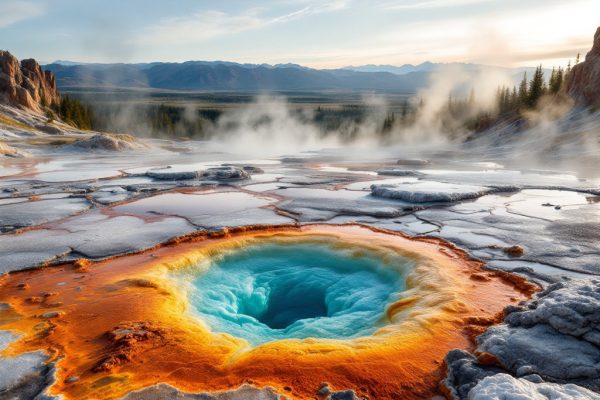Science in Travel: Interesting Trivia
Discover the surprising science behind travel! From boosting your immune system and sharpening your mind to the fascinating impact of space exploration on air travel, this article unveils the hidden benefits and potential side effects of exploring the world. Learn how NASA’s research has revolutionized aircraft design and safety, and explore practical tips for combating jet lag. Plus, uncover unusual travel facts and embrace the spirit of the Apollo missions to make your next adventure truly unforgettable. Start exploring now!
Important information

- Travel benefits your mental and physical health by reducing stress, boosting immunity, and improving mood.
- NASA research, initially for space travel, has advanced aircraft materials, navigation, and safety.
- Jet lag, a sleep disorder from crossing time zones, is worse traveling eastward due to shortened days.
- Adjusting your sleep schedule before a trip, staying hydrated during the flight, and seeking sunlight upon arrival helps combat jet lag.
- Travel can enhance creativity and problem-solving skills while also potentially impacting gut bacteria and oxygen levels at high altitudes.
Science in Travel: Interesting Trivia
Traveling offers surprising health benefits, boosting both your physical and mental well-being. Exposure to new environments strengthens your immune system by prompting antibody production. It also reduces stress and encourages physical activity, contributing to a longer, healthier life. Furthermore, travel can enhance your mood, build confidence, and even improve your sex drive. Navigating unfamiliar situations sharpens decision-making skills. Studies reveal a positive impact on mental health, boosting creativity and overall life satisfaction.
Benefits of Traveling
- Strengthens the immune system by prompting antibody production.
- Reduces stress and encourages physical activity, contributing to a longer, healthier life.
- Enhances mood, builds confidence, and improves sex drive.
- Sharpens decision-making skills by navigating unfamiliar situations.
- Boosts creativity and overall life satisfaction.
Potential Side Effects of Air Travel
- High-altitude flights can alter color and sound perception due to atmospheric changes.
- Crossing time zones disrupts the body’s natural rhythm, leading to jet lag.
The Role of Space Exploration in Travel
Space exploration, particularly NASA’s research, has significantly impacted air travel in several key areas. Advancements in materials science, driven by the need for lightweight yet robust spacecraft, have led to the development of similar components for aircraft, increasing fuel efficiency. Enhanced navigation systems, initially developed for space travel, now benefit air travel, ensuring more precise and reliable routes. Moreover, improved airplane safety protocols are a direct result of NASA’s research on safety systems, enhancing the overall safety of air travel for everyone.
NASA’s Contributions to Modern Travel
NASA research has revolutionized aircraft design and construction, from utilizing advanced materials to improving aerodynamics. Space exploration technologies frequently enhance the safety and efficiency of commercial flights, ultimately making air travel safer and more efficient. For example:
Advanced Materials
NASA’s research on lightweight, high-strength materials, initially intended for spacecraft, has led to the development of stronger and lighter aircraft components. This reduces aircraft weight, leading to significant improvements in fuel efficiency and reduced emissions.
Improved Aerodynamics
NASA’s advancements in computational fluid dynamics (CFD), originally used to simulate spacecraft re-entry, are now used to design more aerodynamic aircraft wings and fuselages. This reduces drag, increases fuel efficiency, and enhances aircraft performance.
Enhanced Safety
Technologies developed for space missions, such as improved sensor systems and advanced navigation tools, have found their way into commercial aircraft, enhancing safety and reliability.
Increased Efficiency
NASA’s research into more efficient propulsion systems, originally designed for space travel, has contributed to the development of more fuel-efficient engines for commercial aircraft, reducing operational costs and environmental impact.
Lessons from the Apollo Missions
The Apollo missions demonstrated remarkable adaptability, ingeniously solving problems in high-pressure situations. This resourcefulness can inspire any traveler to embrace the unexpected and uncover new perspectives. The missions also highlighted the crucial role of meticulous planning for both safety and a richer travel experience. Apollo’s success as a team effort underscores the value of collaboration and clear communication, especially when navigating unfamiliar territory with a group. Inspired by the Apollo missions, here are key takeaways for travelers:
Embrace Adaptability
Be prepared to adjust your plans. Unexpected situations can lead to unique discoveries and unforgettable experiences, much like the Apollo astronauts faced and overcame numerous challenges during their missions. This flexibility allows you to make the most of any journey.
Plan Meticulously
Thorough planning is essential for a smooth and enriching trip. Just as the Apollo missions required extensive preparation, so too should your travels, from booking accommodations and transportation to researching destinations and packing appropriately.
Value Collaboration
Traveling with a group can enhance the experience. Like the Apollo missions, where teamwork was paramount, clear communication and cooperation among travel companions are crucial for navigating unfamiliar environments and enjoying a shared adventure.
Communicate Clearly
Open communication fosters understanding and ensures everyone is on the same page. This is especially important when exploring new places or dealing with unexpected events. Just as the Apollo crew relied on clear communication, so too should travelers to ensure a harmonious and enjoyable experience.
The Science of Jet Lag
Jet lag is a temporary sleep disorder that occurs when your body’s internal clock is disrupted by crossing multiple time zones. Common symptoms include fatigue, insomnia, headaches, and difficulty concentrating. Eastward travel often worsens jet lag because it shortens your day, making it harder for your body to adjust. Westward travel, on the other hand, lengthens your day, which gives your body more time to adapt.
Before Your Trip
Gradually adjust your sleep schedule to the destination’s time zone in the days leading up to your departure.
During the Flight
Stay hydrated by drinking plenty of water and avoid excessive caffeine or alcohol consumption.
Upon Arrival
Expose yourself to natural light to help reset your internal clock. Try to adapt to the local sleep schedule as quickly as possible.
Additional Tips
Consider using melatonin supplements or consulting your doctor for other remedies to alleviate jet lag symptoms.
Why Jet Lag Feels Worse If You Travel from West to East
Traveling east shortens your day, making it harder for your body clock to adjust.
This is because eastward travel forces you to sleep and wake up earlier than usual, which can disrupt your circadian rhythm.
Westward travel lengthens your day, which aligns better with our natural tendency for slightly longer days.
Our bodies adapt more easily to later sleep times, as confirmed by circadian rhythm research. Delaying sleep, therefore, is less disruptive than advancing it.
Effective Strategies to Combat Jet Lag
Gradually adjust your sleep schedule before traveling to prepare your body for the time change.
On the plane, stay well-hydrated by drinking plenty of water.
Upon arrival, expose yourself to natural sunlight, which helps reset your internal clock effectively.
Travel Trivia: Fascinating Destinations and Phenomena
Traveling ignites our curiosity and fuels both creativity and problem-solving. These new experiences stimulate the brain. Studies reveal that travel can reduce stress and anxiety, ultimately improving mental well-being. However, altitude changes can affect oxygen levels, sometimes leading to altitude sickness. Furthermore, travel can also alter gut bacteria, impacting overall health.
Unusual Travel Facts That Spark Curiosity
- Singapore outlaws chewing gum.
- Monaco is surprisingly smaller than Central Park in New York City.
- Slurping noodles in Japan isn’t rude, but a sign of politeness.
- Sweden boasts a unique hotel made entirely of ice, which is rebuilt every year.














